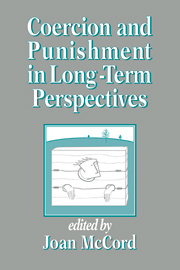Book contents
- Frontmatter
- Contents
- List of contributors
- Acknowledgments
- 1 Introduction: coercion and punishment in the fabric of social relations
- I Mental health, coercion, and punishment
- 2 Relationships as context: supportive and coercive interactions in competent, aggressive, and anxious mother–child dyads
- 3 Parental hostility, childhood behavior, and adult social functioning
- 4 Corporal punishment of children and adult depression and suicidal ideation
- II Family socialization practices and antisocial behavior
- III Aggression and coercion in the schools
- IV Deviance, crime, and discipline
- V Measuring and predicting in studies of coercion and punishment
- Name index
- Subject index
3 - Parental hostility, childhood behavior, and adult social functioning
Published online by Cambridge University Press: 29 September 2009
- Frontmatter
- Contents
- List of contributors
- Acknowledgments
- 1 Introduction: coercion and punishment in the fabric of social relations
- I Mental health, coercion, and punishment
- 2 Relationships as context: supportive and coercive interactions in competent, aggressive, and anxious mother–child dyads
- 3 Parental hostility, childhood behavior, and adult social functioning
- 4 Corporal punishment of children and adult depression and suicidal ideation
- II Family socialization practices and antisocial behavior
- III Aggression and coercion in the schools
- IV Deviance, crime, and discipline
- V Measuring and predicting in studies of coercion and punishment
- Name index
- Subject index
Summary
Introduction
Harsh and coercive parenting, even when it falls short of overt abuse, can have serious negative effects. To date, links with childhood conduct problems and delinquency have been most extensively explored (Loeber & Stouthamer-Loeber, 1986). Patterson (this volume) elegantly demonstrates how parental coercion feeds into the development of antisocial behaviors in childhood, and Cohen and Brook (this volume) trace the reciprocal patterning of these effects over time. Even in families where children are exposed to a range of problematic behavior from parents – where, for example, one or the other parent is psychiatrically ill – parental hostility appears to be among the most important risks (Rutter & Quinton, 1984).
There is mounting evidence that these processes have long-term effects. Early classic studies (McCord, 1979; Robins, 1966) demonstrated the impact of childhood family atmosphere on criminality in adulthood, and more recent reports suggest that long-term vulnerabilities may extend more widely. Holmes and Robins (1987), interviewing adults selected from the Epidemiological Catchment Area (ECA) samples, found that two very different types of adult psychiatric disorder – depression and alcohol problems – were both strongly associated with reports of unfair, harsh, and inconsistent discipline in childhood. In a similar way, Andrews, Brown, and Creasey (1990) found that adverse parenting (in this case abuse and neglect) showed strong links with disorder in the second generation more powerful than those from the parental disorder itself.
- Type
- Chapter
- Information
- Coercion and Punishment in Long-Term Perspectives , pp. 34 - 58Publisher: Cambridge University PressPrint publication year: 1995
- 24
- Cited by



